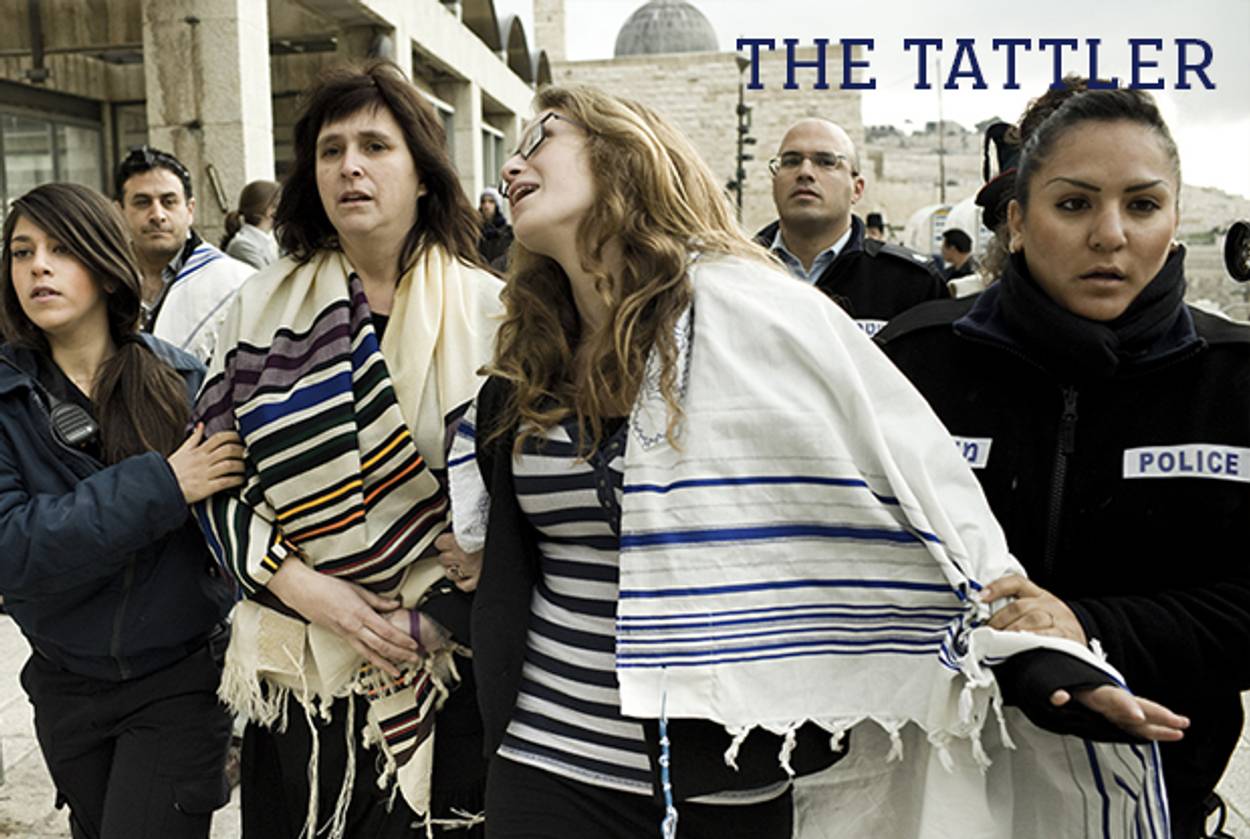Sarah Silverman’s Better Half
The comedian’s sister’s protest of gender inequality at the Western Wall makes a case for holiness, not against




After more than a decade of rape jokes, dick jokes, and sly inversion of all forms of racism, we’re all pretty used to Sarah Silverman and her comedy, which in this era of Girls, “hipster racism,” and hundreds of YouTube videos of the aspiring stars of tomorrow strumming folksy songs about their various bodily functions can seem both oddly prescient and oddly quaint in its resolve to shock.
So, it’s only fitting that another Silverman has emerged on the scene, intent on breaking down a set of very different boundaries: Susan, the comedian’s rabbi sister, who along with her teenage daughter Hallel Abramowitz was among the latest group of women to be detained by Israeli authorities to appease the unbending ire of a bunch of absurdly powerful men dressed as John Galliano. Their transgressions, committed as part of the social action group Women of the Wall, seem to be the usual ones of wearing tallit, reading Torah, and other acts of “gender-bending” that the ultra-Orthodox seem to think will turn the entire Temple Mount into something resembling an extra-fierce episode of RuPaul’s Drag Race (we should be so lucky). The comedian herself was quick to Tweet her support: “So proud of my amazing sister @rabbisusan & niece @purplelettuce95 for their ballsout civil disobedience. Ur the tits! #womenofthewall.”
A man donning a prayer shawl is a sacrament, commanded by God; a woman doing the same thing is an abomination.
While Silverman’s tone may belie the sacredness of its subject, it’s interesting to note the parallels between her mission and her sister’s. As I and others have written before, when Sarah was starting out, most of her critics seemed to be focused less on what she was saying than that a woman was saying it; that she had jettisoned the traditional—and acceptable—“comedienne” script of making jokes about her frustration with men and presumed sexual undesirability that forced her to become funny in the first place and was going places that were darker, dirtier, more taboo. Similarly, the only thing remotely controversial about Rabbi Silverman’s actions is that she is performing them while female. To her opponents, a man donning a prayer shawl is a sacrament, commanded by God; a woman doing the same thing is an abomination.
And yet to me, the biggest violation of the civil rights of the women of the wall (be they capitalized, hash-tagged, or otherwise) isn’t that an allegedly secular agency is doing the bidding of a religious one by policing—sometimes violently—events on the women’s side of the Wall. It’s that there’s a designated “women’s side” at all.
I remember the first time I saw the Western Wall in person. I was 8 years old, a star student at my Jewish Day School, and although I didn’t know it at the time, would never have such an unclouded view of Israel, Judaism, or spirituality again. The Wall had been built up as the crowning glory in a trip that was meant to be full of wonders, the most profound thing I would experience on what was meant to be a trip that would cement my Jewish identity for a lifetime.
Instead, it was the beginning of a long process of disillusionment with the idea of religious ritual itself. Any sense I had of being bathed in God’s holy glow evaporated when I saw the forlorn little corner to which my mother, sister, and I were relegated. The vast expanse of the Wall, the one in all the photographs, was off-limits to me, no matter how well I behaved or how respectfully quiet I was. I felt rejected, unwelcome, unequal, and that everyone who went on and on about the sacredness of the place was to put it bluntly, totally full of crap. Whatever I had was the opposite of Jerusalem syndrome, and it never went away.
It’s not that I don’t get the concept of a mechitza, or partition. I’m not a big fan, but I’m not a big fan of synagogue in general, and if I happen to be in one where that’s part of the deal, I’m happy to be respectful of the needs and values of a tradition that isn’t quite my own, just as I would be if I was in a church or a mosque. But the Wall is different, because there’s only one of it. If it really is the holiest spot in the world for Jews, than it should belong equally to all of us—from mini-skirted, bacon-eating, not-so-Zionist women like me to the frummiestrebbewho ever threw a rock at them. And if Israel, as it purports to be, is truly the Jewish homeland, than it should be the duty of its civil courts to uphold that equality for all Jews, regardless of denomination of gender. The Wall belongs equally to all of us, and we should all be equal in its presence, no matter what the undemocratically elected rabbis say. It might sound crazy, but this is Israel, a place that isn’t exactly known for its lack of audacity (not to mention sanity). If you will it, it is no dream. The tits are nothing to fear.
***
Like this article? Sign up for our Daily Digest to get Tablet Magazine’s new content in your inbox each morning.
Rachel Shukert, a Tablet Magazine columnist on pop culture, is the author of the memoirs Have You No Shame? and Everything Is Going To Be Great. Starstruck, the first in a series of three novels, is new from Random House. Her Twitter feed is @rachelshukert.
Rachel Shukert is the author of the memoirs Have You No Shame? and Everything Is Going To Be Great,and the novel Starstruck. She is the creator of the Netflix show The Baby-Sitters Club, and a writer on such series as GLOW and Supergirl. Her Twitter feed is @rachelshukert.